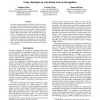Free Online Productivity Tools
i2Speak
i2Symbol
i2OCR
iTex2Img
iWeb2Print
iWeb2Shot
i2Type
iPdf2Split
iPdf2Merge
i2Bopomofo
i2Arabic
i2Style
i2Image
i2PDF
iLatex2Rtf
Sci2ools
114
click to vote
FLAIRS
2010
2010
Using Ontologies in Case-Based Activity Recognition
Pervasive computing requires the ability to detect user activity in order to provide situation-specific services. Case-based reasoning can be used for activity recognition by using sensor data obtained from the environment. Pervasive computing systems can grow to be very large, containing many users, sensors, objects and situations, thus raising the issue of scalability. This paper presents a case-based reasoning approach to activity recognition in a smart home setting. An analysis is performed on scalability with respect to case storage, and an ontology-based approach is proposed for case base maintenance. We succeeded in reducing the casebase size by a factor of one thousand, while increasing the accuracy in recognising some activities.
Artificial Intelligence | Case-based Reasoning | Case-Based Reasoning Approach | FLAIRS 2010 | Pervasive Computing Systems |
Related Content
| Added | 11 Feb 2011 |
| Updated | 11 Feb 2011 |
| Type | Journal |
| Year | 2010 |
| Where | FLAIRS |
| Authors | Stephen Knox, Lorcan Coyle, Simon Dobson |
Comments (0)

